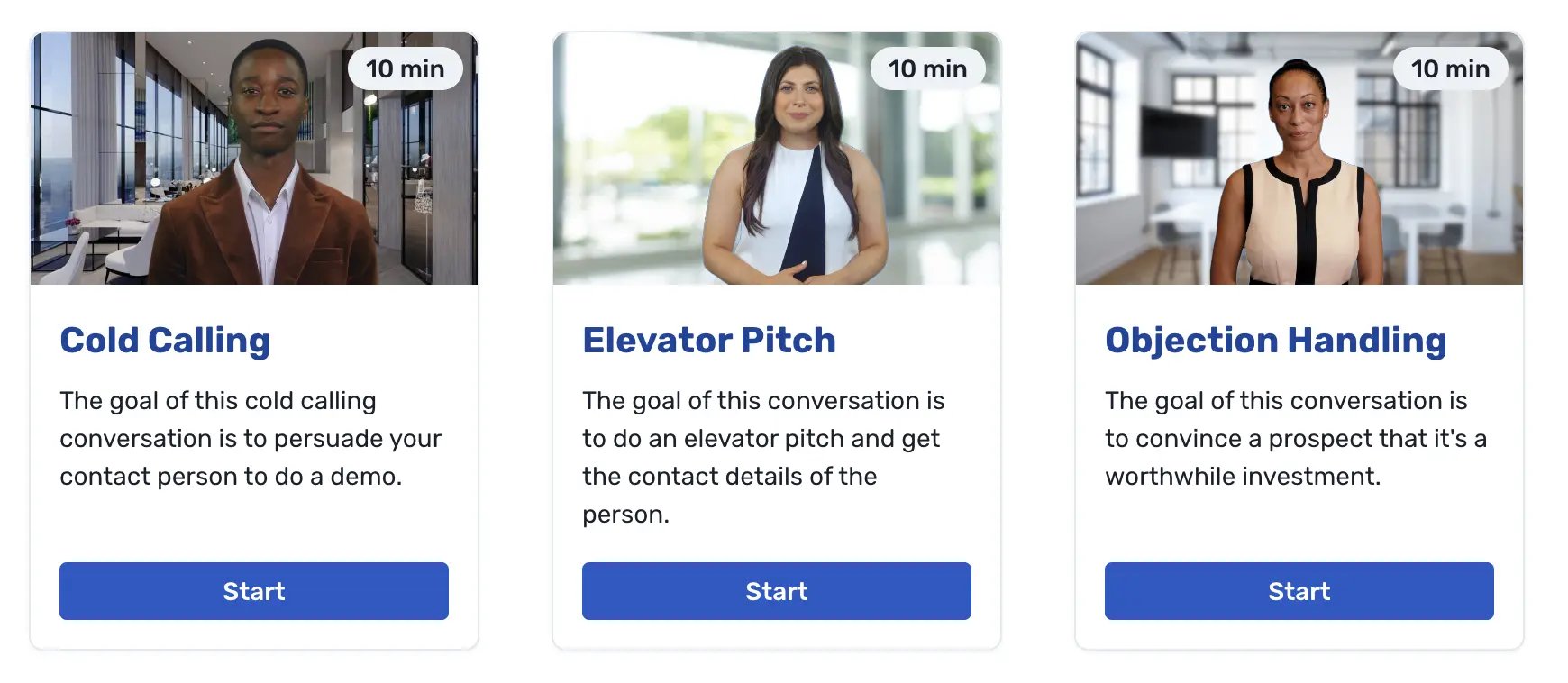According to research on sales negotiations, most sales reps cave and give into pure price concessions, but most buyers admit to being able to pay more.
The art of negotiating is challenging at the best of times, even for a seasoned sales rep. Throw in a complex deal, a difficult prospect, or heat from competitors, and you have sales reps finding themselves in high-pressure situations that require a lot of practice and preparation in order to see successful negotiation outcomes.
How are organizations ensuring their sales teams are equipped with the negotiation skills and confidence to execute a successful negotiation?
Are your sales teams equipped with the negotiation skills they need to close even the most challenging deals?
What's in this post:
What is negotiation skill training?
The skill of negotiation is not just a crucial capability to possess in an era of dynamic customer preferences, but a skill that punches above its weight, regardless of whether a company is B2B or B2C.
Before jumping into the ins and outs of negotiation training, let's cover what negotiation really means.
Negotiation can be defined as a process in which two or more parties seek agreement on what each shall give to and take from the other(s). In sales, this negotiating process happens with some back and forth between the parties, with the aim to arrive at a goal, often with some compromises being made.
Unfortunately for some, not everyone has negotiating skills imprinted in their genes. Despite the negotiating process being usually the successful part of a sales strategy, it can also be the most daunting and stress-inducing.
That is why successful sales teams are supported with effective negotiation tools, courses, and training to ensure they are fully equipped with the practical negotiation skills and confidence to navigate through sales conversations with ease and generate positive outcomes.
Why is negotiation training so important for sales teams?
What use is a sales conversation without arriving at a goal?
Negotiation becomes a key phase when a seller and buyer are trying to reach an agreeable deal. Without negotiation mastery, a prospect stays just that - a prospect.
Further, negotiating well holds significant sway in helping sales reps create long-lasting connections with the customers - during the negotiation phase, both parties have the opportunity to communicate effectively, understand negotiation dynamics, and bring their opinions out.
Even after their sales procedures are complete, sellers who are engaged in a negotiation can position themselves as important resources that their buyers can turn to for advice and knowledge if they can maintain their composure, consultative attitude, and compassion throughout the dialogue.
What are the top negotiation skills?
Negotiation skills are an indispensable asset for every sales rep, regardless of industry. So what are the top negotiation skills that a sales rep should refine to ensure they negotiate effectively and secure maximum value? What practical exercises and interpersonal techniques should negotiation skills training courses cover?
1. Active listening
Too frequently, salespeople begin a typical sales pitch first and only begin to listen later—when it is already too late. This is a classic instance of selling rather than addressing a problem, of forcing and boxing a prospect into a one-size-fits-all solution that doesn't fit at all and doesn't satisfy their true need.
2. Mirror emotions and tone
By mirroring the tone of the customer, a sales rep can build trust and rapport with a client, which is one of the first and most important steps in establishing a connection. Imagine a sales rep being overly positive when the prospect is feeling irritated about their current situation - this imbalance could lead to a heightened sense of frustration in the prospect who will feel like the sales rep doesn't truly understand how they're feeling. Instead, when reps make an effort to relate to the speaker's emotional state and understand their situation, prospects will feel heard and be more likely to foster trust.
3. Cultural sensitivity
As companies expand globally, cross-cultural sensitivity becomes a strategic necessity for business success, not just mere etiquette.
For example, in the well-known book 'The Culture Map', author Meyer highlights a system of eight scales (communicating, evaluating, persuading, leading, deciding, trusting, disagreeing, and scheduling) that can be used to determine how cultures vary along a spectrum. The scale can essentially be used to look at how one culture goes about its interactions and compare it to another, ultimately highlighting where issues and miscommunications can occur.
Considering the culture of the prospect and their communication style can help minimize misunderstandings and increase the likelihood of a successful negotiation.
4. Finding alternatives
In many cases, a sales negotiation process is hardly a smooth sailing process. Objections happen all the time, and it's a sales rep's job to find those alternatives and keep leading to conversation to a closed deal.
The most frequently negotiated clause in a contract is the price, but there are other ways to get a win-win solution.
Teach salespeople to consider alternate possibilities, such as:
- Beginning with a smaller initial commitment to establish confidence.
- Removing something from the bundle to reduce the cost.
- Offering different payment arrangements/methods/installments
5. Closing
Your capacity to persuade a prospect to accept the offer you've made during a negotiation is referred to as your closing skills. Closing a sales deal after a negotiation can look like many things, for example, a free trial, a limited-time offer, the artisan close, etc.
The skill of handling objections also of course plays a big part in this phase. Read our article here about how you can prepare your sales reps to handle objections like pros.
What is the best negotiation skill training?
In an era where countless sales training solutions exist, picking the right online courses and training platforms to help your sales reps achieve negotiation mastery is critical.
The challenges in e-learning negotiation training courses
Building remote capabilities has been shown to be a crucial lifeline for firms as they make the move to vastly varied working methods over the past few years. Despite the fact that seminars and workshops are frequently conducted in person, most firms nowadays recognize the need to transition to remote settings, and employee training is undoubtedly no exception.
Despite the well-known benefits, namely their convenience, and cost reduction due to not needing an in-person trainer, these platforms don't go without their limitations.
One of their biggest pitfalls is in fact their lack of engagement. Since they typically employ Situational Judgment Tests (SJTs), sales reps during their training are provided with pre-selected answer options. This inhibits reps from retrieving knowledge in real time, which has a major effect on knowledge retention.
The role of AI in negotiation skills training courses
As companies are realizing the necessity of interactivity to produce meaningful results and knowledge retention within sales training, sales teams worldwide are beginning to address this issue through Al. Aside from their training engagement value, cost reduction is also a huge benefit that companies adopting AI for training are reaping.
According to a report by Deloitte, AI-powered training offers a wide range of elements that improve a learner's experience and thus ensure the sustainable development of their skills.
-
Personalization: Al is capable of identifying a variety of individual learning patterns, which in turn can progressively ascertain which kind of learning experience produces the best outcomes for various learners.
-
Integrate training within the workflow: Al can intelligently integrate chosen training into employees' regular activities and automatically break up training into manageable bits.
-
Rehearse your conversations: With the use of Al technologies, learners can have access to Al "coaches" to monitor their development and offer on-demand feedback, when the learner is likely to take the feedback on board to ensure sustainable behavior change.
How do you implement AI-powered training?
Implementing AI-powered training solutions has never been easier. For one organization, a major insurance company in Germany, AI-powered sales training came in clutch, helping their sales rep refine their conversation and negotiation abilities before speaking with real clients.
Director of HR Qualification Sales at the insurance company said, "Incorporating Al into our pilot sales project allowed us to break free from traditional in-person and e-learning solutions, embarking on a path of innovation. Conventional face-to-face training, sadly, tends to be passive, leading participants to disengage. With Al at the helm, we've unleashed a transformative approach that keeps trainees engaged and empowers them to take control of their customer-centric journey."

So, ready to heighten training with AI? Is your business ready to take their negotiation skills training to the next level?
Try out our AI for your sales reps here, and see for yourself what it can do!
- Real-world sales experience: A good sales trainer or training program should have real-world sales experience to gain insights and credibility with the trainees.
- Effective communication skills: An effective sales trainer must be a master communicator to keep the trainees engaged throughout the program. The training should hold the participants' attention, cover a fair amount of information in a relatively short time, and be authentic and genuine.
- Specific skill development: Sales training should be a process of providing the sales force with specific skills to perform better and correct deficiencies in their sales performance.
- Effective time management: A good sales training program should teach salespeople how to manage their time effectively to make the most of every minute of the day so they can spend more time on actual sales. Some of the time management skills that can be taught include prioritizing tasks and planning the day.
- Accessible and bite-sized content: The sales training program should provide bite-sized content that is accessible on a mobile device, making it easier for sales personnel to absorb the training content in the field or on the go. Short-form content keeps trainees more engaged and encourages them to keep learning.
- Collaboration: A good sales training platform should be collaborative, allowing various departments within an organization to work together and share best practices to create deep and relevant experiences.
- Mentorship: Providing mentor relationships between managers and experienced reps is one of the most effective ways to level up the team's sales skills.
- Learner-focused: Great sales trainers should be learner-focused and use sound sales training methodology and strong facilitation skills to draw out best practices and transfer knowledge.
- Individualized approach: The trainer should adjust the training programs to the individual abilities and aptitudes of the trainees. Individual teaching machines and adjustments of differences should be provided.
- Self-direction: A good sales training program should provide ample learning opportunities that exist outside of the traditional classroom setting and nurture self-direction by allowing sellers some level of autonomy throughout the process.
Retorio’s training platform brings an immense amount of tangible benefits for your teams, which in turn help your organization reach its goals. Some ways that teams benefit from using Retorio’s AI-powered video simulations is by:
- Personalized skill development: Gone are the days of one-size-fits-all training content. We understand the importance of personalization, especially when it comes to training content, and our bespoke training content ensures that each team member receives targeted training and guidance to maximize their potential.
- On-demand, tailored feedback: We know what the difference between good and great feedback can be, and Retorio’s AI training does so through highly personalized and timely feedback. Retorio’s AI coach provides real-time, in-context feedback during as well as after training. With feedback given during training to your teams, learners are able to adjust and modify behavior easily to see immediate performance improvement.
- High engagement: One of the biggest pitfalls of virtual training is the lack of engagement. Retorio’s training is designed with engagement at its core - our training makes sure team members are fully engaged with our interactive AI simulations, which in turn ensure learners retain the learned knowledge.






